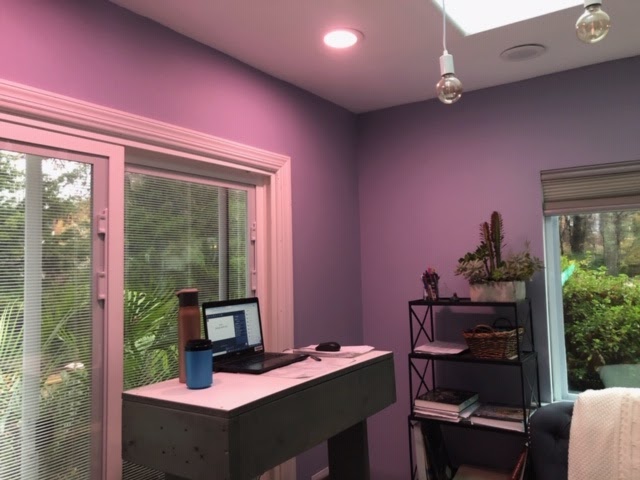The Flip Side: How teachers are adjusting to virtual learning
Biology teacher Jennifer Fisher’s setup while teaching classes. “Normally I would be able to see the classroom’s mood, what students are understanding and what they are struggling with,” English teacher Vincent Pollet said. “We just don’t have that online.”
November 13, 2020
One quarter of the year, nine weeks, 41 days, over 200 hours. That is how long Jefferson students have spent in virtual learning and on Blackboard Collaborate. The struggles of the students during this time are widely known, from the “de-stress” newsletters sent about by Jefferson administration to the daily check-ins in class. However, less is known about people on the opposite side of the screen.
“It is definitely harder to teach,” English 10 and 11 teacher Vincent Pollet said. “It’s an adjustment. It is something you have to get used to doing.”
Having the ability to connect with students has been a priority for teachers, one that the virtual education platforms have been unable to provide. Teachers are reporting extremely a small number of students turning on their cameras during class.
“It’s very lonely,” IBET Biology and AP Biology teacher Jennifer Fisher said. “I just stare at my computer and I know people’s names but I have no idea what people look like. It’s not as fulfilling. No teacher went into the teaching career just to lecture.”
Transferring from in person curriculum to the virtual platform has been one of the most difficult tasks for Jefferson teachers.
“You’re trying to take things that work well in the classroom and change them to make them work online,” Pollet said. “Sometimes you can do that, but if students are supposed to get up and physically interact, you cannot replicate it online.”
While sitting in the comfort of home can be enjoyable at times, the environment is much less suitable for learning than in the school building. Distractions are always waiting around the corner.
“The noises are the biggest issue,” Fisher said. “There’s the trash trucks coming by, people doing lawn work, my kids, internet problems, and my pets. It’s rough.”
Jefferson teachers are still determining the degree of change necessary when adjusting to the virtual environment compared to in-person.
“I’m not trying to reinvent the wheel,” Pollet said. “We’re doing virtual learning for a limited amount of time and at some point, we will hopefully go back to the classroom.”
Despite all the difficulties with online learning that arise during the pandemic, teachers are still persevering by working with students during office hours, hosting virtual 8th period clubs, collaborating with other teachers, and representing the Jefferson academic culture. This unique period in time has also given rise to several benefits.
“There are things you don’t have to worry about like commuting and what you’re wearing,” Fisher said. “I try to hang on to those positive ideas. This is not an ideal situation, but I am going to make the best of it.”






